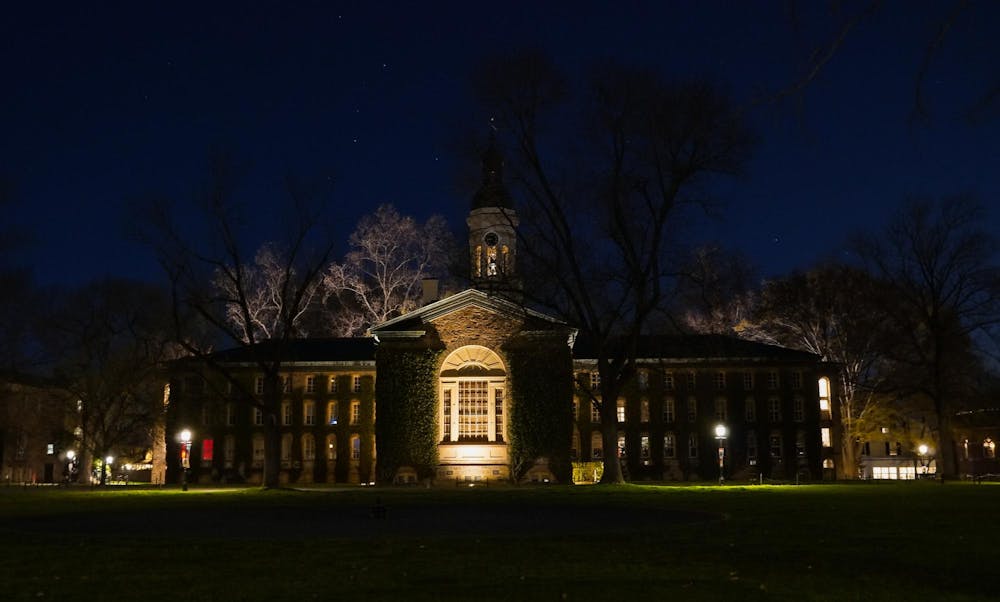Last Thursday, the Foundation for Individual Rights and Expression (FIRE) and the Anti-Defamation League (ADL) addressed a letter to President Christopher Eisgruber ’83 accusing Princeton University community members of leveraging no-contact and no-communication orders (NCOs) to “censor student journalists.”
The groups suggested that Princeton could face “legal and reputational liability” if the University doesn’t change course, requesting that Eisgruber provide a “substantive response” to the letter by this Thursday, Feb. 1. According to University Spokesperson Michael Hotchkiss, the University has recently changed its NCO policy “in response to concerns expressed by community members.” Publicly available guidelines on NCOs have been significantly shortened from 13 to two pages.
The letter cited two incidents in which NCOs were obtained against members of Princeton’s conservative publication, The Princeton Tory, while reporting on public protests by pro-Palestinan Princeton organizations in the past two years.
In a comment to The Daily Princetonian, Hotchkiss wrote that NCO orders “do not curtail journalistic activity.”
The letter from the ADL and FIRE made an explicit connection between the issue of NCOs and the campus conversation surrounding the conflict in Israel and Palestine.
“In the wake of the October 7 Hamas terrorist attacks against Israel, contentious debates on the conflict have dominated campus discourse,” the letter stated. “Princeton is stifling these discussions and newsgathering by its student press, by permitting students who dislike certain speech to be granted no-communication or no-contact orders against other students.”
Founded in 1999 by Princeton alumni Harvey Allen Silverglate ’64 and Alan Charles Kors ’64, FIRE is a nonpartisan, nonprofit organization focused on “[combatting] censorship and due process violations on college campuses,” according to its website. The ADL describes itself as an “anti-hate organization” specifically focused on combating antisemitism.
Both no-communication orders and no-contact orders (NCOs) “[provide] that two parties may not have any communication with each other in-person or through another party, by telephone, letter, e-mail, or other electronic media, or by any other means, including via social media.” While a no-communication order applies this requirement to contact “on-campus and in the local vicinity,” a no-contact order places responsibility on the involved parties to “make a concerted effort to avoid any close proximity to the other party.”
In the first incident in February of 2022, current Tory editor Danielle Shapiro ’25 claimed that she received an no-communication order from Harshini Abbaraju ’22, a member of Princeton Committee on Palestine (PCP), who organized a protest outside of the Center for Jewish Life (CJL) opposing University-affiliated internships in Israel. In an op-ed in The Wall Street Journal, Shapiro criticized the policy, writing that the NCO order “prohibited [her] from doing [her] due diligence as a reporter.”
Hotchkiss wrote to the Princeton Alumni Weekly in November 2022 that the University adapted its policy following the op-ed to require students seeking an NCO to “first communicate in writing with the other party” in instances without significant conflict.
The 2024 letter states that FIRE previously reached out to the University, writing last January that the change “may worsen the situation.” It also accused the University of later “[failing] to follow its own policies” in a second incident involving former Tory Editor-in-Chief and current Publisher Alexandra Orbuch ’25.
Although the letter does not name Orbuch, it references an incident at the second pro-Palestine walkout on Nov. 9 where a graduate student “attempted to block [her] camera” and later issued a no-contact order against her without providing the required written notice. Orbuch posted about the incident on X, saying that the protester pushed her and stepped on her foot.

“It is saddening that Princeton students must decide between ensuring their physical security and safeguarding the future of their academic careers and fulfilling their roles as reporters. This is not a choice that anyone in a free society should have to make,” Orbuch wrote in a statement to the ‘Prince.’
In contrast, Hotchkiss explained that “even if one is subject to such an order, referring to or reporting about someone in a journalistic forum would not generally be prohibited.”
“While Princeton did finally inform me that the order does not prevent me from reporting on this rally and the harassment, this only occurred after two months had passed and lawyers from national nonprofits got involved,” Orbuch wrote.
Hotchkiss also wrote in his statement to the ‘Prince’ that the University “reviewed its process for No Contact and No Communication orders in the summer of 2022 and December 2023, in response to concerns expressed by community members.”
Referring to the most recent changes, Hotchkiss added, “As a result, the University has narrowed the circumstances under which such orders can be issued.”
The December revision to the FAQ is only two pages, as compared to 13 pages as of Jan. 16, and excludes sections about potential conflicts between parties involved in an NCO. The new FAQ is also less explicit regarding how to request an NCO, but this information is included in the University’s Conflict Resolution guidelines.
The letter from the ADL and FIRE also cited Eisgruber’s 2024 State of the University address, which emphasized and defended the University’s free speech policies.
“The mere fact that speech is offensive is never grounds for discipline at Princeton; the speech must fall under one of the enumerated exceptions to our free expression policy, such as those permitting the University to restrict threats or harassment,” Eisgruber wrote. “Censorship has a lousy track record.”
FIRE and ADL wrote that “Princeton’s commitments to free speech are admirable — but only to the extent to which they are followed.” The end of the letter demanded that the University make a “substantive response” to the letter no later than Feb. 1, noting that lack of legal action may lead to “legal and reputational liability.”
Elisabeth Stewart is an assistant News editor for the ‘Prince.’
Please send corrections to corrections[at]dailyprincetonian.com.








